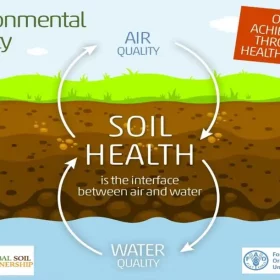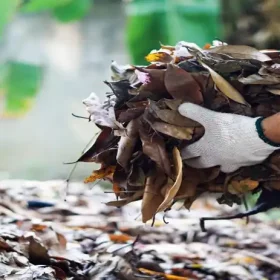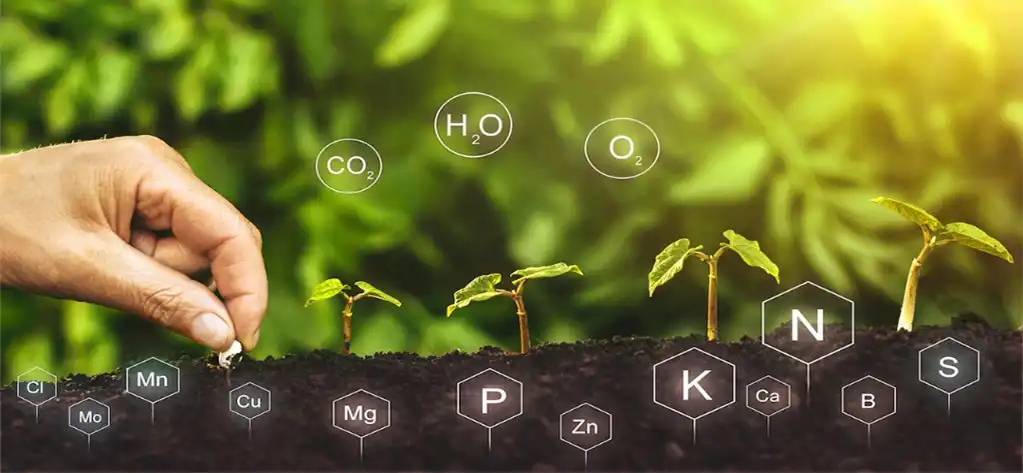At Enrich Environmental Ltd, we know that healthy soil is at the heart of every thriving ecosystem — from home gardens to large-scale farms. While some headlines warn that soil degradation is one of the biggest threats to our environment, others highlight soil as a key solution to the climate crisis. So, what’s really going on beneath our feet—and how can we all help?
Why is it important?
Soil is more than just the ground we walk on: it’s a living, dynamic system essential to life on Earth. Found in gardens, parks, forests, and farmland, soil supports biodiversity, feeds our planet, stores carbon, and filters water. Yet it is still one of the most overlooked natural resources.
We often recognise the importance of clean air and water but forget that soil underpins both; quite literally.
- FOOD: Soil produces around 95% of the food we eat. From grains and vegetables to the plants that feed livestock, healthy soil is essential for a secure food supply.
- HEALTH: Soil quality directly impacts the nutritional value of our food. A study analysing hundreds of carrots found those grown in healthy soil contained up to 90 times more antioxidants and up to 200 times more polyphenols than carrots grown in degraded soils—natural compounds essential to human health.
- CARBON: Soil is one of Earth’s largest carbon sinks. It stores more carbon than the atmosphere and all the world’s vegetation combined. But when soil is degraded—through erosion, over-cultivation, or chemical inputs—it loses its ability to store carbon, contributing to greenhouse gas emissions and accelerating climate change.
- MEDICINE: A single teaspoon of healthy soil can contain more microorganisms than there are people on Earth. Many life-saving antibiotics, including streptomycin, were first derived from soil bacteria.
- ENVIRONMENT: The complex soil food web creates structure that allows water to infiltrate the ground, reducing flooding and helping plants survive drought. Healthy soil improves water retention and resilience to extreme weather—factors becoming increasingly vital in the face of global climate shifts.
The Threat of Modern Farming Practices
Globally, industrial farming practices have taken a toll on soil. Ploughing, heavy machinery, and the overuse of synthetic fertilisers and pesticides disrupt the biological life of soil and break down its structure. Practices like monocropping, growing a single crop year after year—deplete nutrients and require more chemical inputs, which further degrade the land.
These methods not only damage soil biodiversity, but also reduce its ability to store carbon and retain water. Agricultural soils around the world are eroding faster than they can regenerate, threatening future food security and accelerating ecological decline.
The Compost Connection: Nature’s Regenerative Tool
This is where compost plays a transformative role. Compost is a biologically active, nutrient-rich material made from decomposed organic matter. When added to soil, it acts as both a fertiliser and a soil conditioner:
- Improves soil structure by binding soil particles into stable aggregates, enhancing aeration in clay soils and water retention in sandy soils.
- Feeds plants slowly and sustainably by releasing nutrients like nitrogen, phosphorus, potassium, calcium, and magnesium in sync with plant uptake.
- Boosts microbial life, reinvigorating the underground ecosystem with beneficial bacteria, fungi, and protozoa that drive nutrient cycling and suppress plant diseases.
- Supports carbon sequestration by increasing organic matter and helping soil lock away carbon for the long term.
Healthy soils enriched with compost become more drought-resilient, better at storing water, and less prone to erosion. They reduce reliance on synthetic fertilisers and support healthier crops, benefiting the planet and our food systems. The cation exchange capacity (CEC) of soils increases with higher organic matter levels, meaning compost-enriched soils can hold onto essential nutrients more effectively. This reduces nutrient loss and improves the efficiency of nutrient uptake by plants, especially in sandy or degraded soils.
The Rise of Regenerative Farming
Farmers around the world are beginning to adopt regenerative practices that focus on rebuilding soil health rather than depleting it. These methods include:
- Reducing tillage or using no-till systems
- Planting cover crops and diverse crop rotations
- Applying compost and organic amendments
- Integrating livestock for natural fertilisation
- Minimising chemical inputs to let natural ecosystems recover
These approaches restore the vitality of soil, improve biodiversity, and create more resilient farming systems. They are also helping to reverse carbon loss, making agriculture part of the climate solution rather than the problem.
From Dirt to a Climate Hero
Soil’s role is shifting from overlooked resource to environmental superhero. As nations, businesses, and individuals look for scalable climate solutions, soil health is emerging as a linchpin. To know more about soil is to care more, and to act.
Whether you’re a home gardener, landscaper, educator, or farmer, your choices can make a difference. Using compost, choosing regeneratively grown food, and supporting sustainable farming are all steps that contribute to healthier soils and a healthier planet.

What Can You Do?
Watch educational documentaries like Kiss the Ground, which highlight how soil can help reverse climate change. Support food producers who focus on sustainable practices. Look for certifications like organic, regenerative organic, or pasture-based agriculture. If you garden at home, use peat-free compost and consider composting your food waste.

A Word From Enrich Environmental Ltd
At Enrich Environmental Ltd, we’re proud to play a part in this vital cycle. Our high-quality compost products are made from green waste, helping to divert organic matter from landfills and return it to the soil.
Compost improves soil structure, enhances microbial activity, supports plant growth, and helps soil act as a carbon sink. It also offers a sustainable, peat-free alternative, preserving fragile peatland ecosystems and reducing carbon emissions.
By using compost, you’re not just feeding your plants, you’re rebuilding the very foundation of life on Earth. Soil health is planet health, and it starts with what we put back into the ground.
